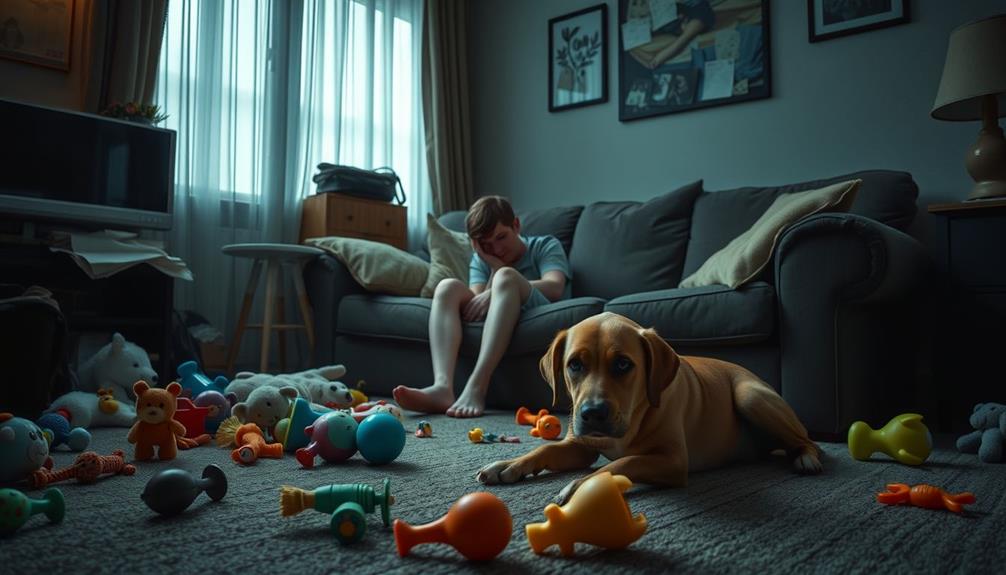Pets can greatly support individuals with BPD by providing emotional stability and comfort during tough times. Their presence helps ground you during intense emotions, while caring for a pet encourages daily routines that can reduce impulsivity. You'll find that bonding with your pet fosters a sense of purpose and combats feelings of loneliness. Additionally, pets can enhance social interactions, helping you build connections and support networks. As you engage in pet care activities, you also develop essential skills for emotional regulation. There's plenty more to discover about how pets can positively impact your mental health journey.
Key Takeaways
- Pets provide emotional support and comfort, reducing stress and enhancing mood through oxytocin release during interactions.
- Engaging in pet care fosters routines, accountability, and a sense of purpose, which are essential for managing BPD symptoms.
- The presence of pets encourages social interactions and helps build supportive networks, alleviating feelings of loneliness and isolation.
- Caring for pets enhances emotional regulation and coping mechanisms, contributing to improved overall mental health and stability.
- Professional guidance in selecting pets ensures compatibility with individual emotional needs, reinforcing therapeutic benefits and support.
Emotional Benefits of Pets

How can having a pet transform your emotional landscape when dealing with Borderline Personality Disorder (BPD)? Pets offer a unique form of emotional support that can greatly enhance your emotional stability. Their presence provides comfort and grounding during turbulent times, fostering a sense of security that's often hard to find.
This sense of security is particularly important for individuals with BPD, as they often experience intense episodes of anger, depression, and anxiety emotional dysregulation.
Particularly with dogs, you'll notice the release of oxytocin, a hormone that boosts your mood and reduces stress. This chemical reaction can help you cultivate healthier interpersonal relationships, thanks to the unconditional love pets provide.
Additionally, owning a pet encourages you to establish routines in your daily life, which can help curb impulsivity and self-harm behaviors commonly associated with BPD.
Studies have shown that pets can break cycles of negative thoughts and feelings, offering a calming effect that can shift your emotional state. Engaging in pet care activities also motivates you to focus on self-care and explore new hobbies, which can enhance your social connections and overall well-being.
Ultimately, the emotional benefits of having a pet can be a powerful tool in managing the complexities of Borderline Personality Disorder.
Behavioral Support Through Pet Care

Caring for a pet can greatly enhance your ability to manage Borderline Personality Disorder (BPD) by providing essential behavioral support. Establishing a routine through pet care creates structure in your life, helping to manage impulsivity and reduce self-harm behaviors. The responsibility that comes with caring for a pet encourages you to hold yourself accountable, promoting healthier choices and a focus on your well-being.
Additionally, engaging in activities with your pet can improve your emotional stability, as certain routines may align with the benefits of astrological compatibility for personal well-being. Engaging in regular activities, such as feeding, walking, and playing with your pet, not only boosts your emotional stability but also strengthens your coping mechanisms. This engagement can help you resist urges for self-destructive behaviors.
The bond you form with your pet fosters a sense of purpose and identity, countering the feelings of emptiness and instability often experienced in BPD. Moreover, interacting with pets can facilitate the development of interpersonal skills, which are vital for improving your relationships and reducing feelings of isolation.
As you nurture your pet, you also cultivate emotional regulation, enhancing your ability to manage your emotions effectively. Overall, pet care offers a multifaceted approach to behavioral support that can greatly benefit your journey in managing BPD.
Choosing the Right Pet

Selecting the right pet can greatly influence your emotional well-being, especially when managing Borderline Personality Disorder (BPD). When you evaluate a pet, focus on their temperament and energy level to guarantee they align with your emotional needs and lifestyle.
Friendly breeds like Labrador Retrievers and Golden Retrievers often provide the emotional support you might need due to their nurturing nature. Additionally, pets can offer companionship that may help reduce feelings of isolation, which is important for individuals with BPD. Engaging with animals can also serve as a form of therapy, complementing traditional treatment methods such as dementia medications for the elderly.
Here are some key factors to take into account:
- Assess your living situation and daily routine.
- Choose a pet size that's manageable for you.
- Look for breeds known for their calm and friendly temperament.
- Involve mental health professionals in your decision-making.
- Reflect on your ability to maintain a consistent routine with pet care.
The Role of Professional Guidance

When integrating a therapy dog into your treatment plan, professional guidance is key.
Mental health experts can help guarantee the dog's temperament matches your needs and support your emotional growth. They may also suggest complementary therapies, such as using essential oils for relaxation, to further enhance your well-being.
With their oversight, you can safely navigate the responsibilities of pet ownership while enhancing your mental health journey.
Importance of Professional Oversight
Integrating therapy dogs into treatment plans for individuals with Borderline Personality Disorder (BPD) requires careful oversight from mental health professionals. This professional oversight is vital to guarantee that the therapy dog complements your existing therapeutic interventions and enhances your mental health outcomes.
- Professionals help select the right therapy dog based on temperament, breed, and your individual needs. By applying a methodical approach to the selection process, professionals can confirm a suitable match that maximizes the benefits of the therapy dog.
- Ongoing support allows for monitoring your progress and adjusting the treatment plan as necessary.
- Collaboration with mental health experts reinforces a thorough approach, combining therapy dogs with traditional methods.
- Addressing challenges related to pet ownership, such as financial strain and emotional stress, is essential for maintaining balance.
- Professional guidance guarantees that therapy dogs serve as a complementary resource, not a replacement for psychotherapy or medication.
Integrating Pets Safely
Bringing a therapy dog into your life can be a transformative experience, but it is crucial to have professional guidance throughout the process. Mental health professionals play an essential role in ensuring that the therapy dog you select aligns with your specific needs, particularly when managing Borderline Personality Disorder (BPD). They can help you assess the temperament and breed suitability for your situation.
Here's a quick reference to reflect on when integrating a therapy dog:
| Considerations | Professional Input |
|---|---|
| Identify specific mental health needs | Consult with mental health professionals for personalized recommendations |
| Assess the dog's temperament | Work with trained organizations to find a suitable match |
| Monitor integration progress | Regular check-ins with professionals to adjust care as needed |
| Understand pet ownership responsibilities | Seek guidance on practical aspects of caring for a therapy dog |
Ongoing support from mental health professionals is vital. They can help you navigate the emotional and practical challenges of pet ownership, ensuring that your therapy dog enhances your mental health journey while fitting seamlessly into your treatment plan.
Community and Social Connections

Having a pet can greatly boost your social interactions and help you build supportive networks. With their companionship, you might find it easier to connect with others and enhance your emotional well-being.
Pets can also encourage you to engage in outdoor activities, thereby increasing your chances of meeting new people and expanding your social circle, which is essential for individuals with tick-borne disease prevention concerns.
Fostering Social Interaction
In the domain of mental health support, pets play a pivotal role in fostering social interaction for individuals with borderline personality disorder (BPD). By providing companionship and emotional support, pets help you break free from cycles of negative thoughts, creating a more positive social environment. They serve as social facilitators, making it easier to connect with others and form friendships.
Additionally, unexpected pet antics can lighten the mood during challenging times, similar to how silly tantrums often occur during family photoshoots, adding humor to daily interactions.
Engaging in pet care activities encourages a routine that can lead to increased participation in community events. Your pet not only alleviates feelings of loneliness and isolation but also enhances your overall social support networks. Pets often act as conversation starters, allowing you to bond with fellow pet owners and share experiences.
Here are some benefits of pet ownership for fostering social interaction:
- Pets encourage you to engage in community activities.
- They serve as emotional anchors during tough times.
- Pet care routines provide structure to your day.
- Sharing pet-related stories fosters connections with others.
- Pets can help ease feelings of loneliness and promote companionship.
Incorporating a pet into your life can greatly enhance your social interactions and connections, making your journey with BPD more manageable.
Building Support Networks
Pets not only enhance social interactions but also play a notable role in building robust support networks for individuals with BPD. When you own a pet, you create opportunities for social connections that mightn't otherwise occur. Pets naturally attract attention, making it easier to strike up conversations and form friendships, which can meaningfully reduce feelings of isolation.
This aligns with the idea that emotional and psychological growth occurs through interactions with the environment, as having a pet can foster new relationships and experiences key domains of development.
Additionally, the responsibilities of pet ownership encourage routine activities, promoting community engagement. Whether you're participating in dog training classes or attending pet-focused events, these activities help you connect with others who share similar interests.
Such interactions lay the groundwork for stronger support systems.
Moreover, the emotional support pets provide can help break cycles of negative thoughts and feelings, allowing you to engage more positively with others. Studies show that pets serve as a bridge, connecting you with a wider network of people who can offer understanding and companionship.
Ultimately, by fostering social connections through your pet, you build a network that enhances your sense of belonging, making it easier to navigate the challenges of BPD with the support of a compassionate community.
Enhancing Emotional Well-being
Emotional well-being thrives in the presence of a loyal companion, especially for individuals with Borderline Personality Disorder (BPD). Pets play an essential role in enhancing this emotional state by offering companionship that alleviates feelings of loneliness and isolation.
Their therapeutic value is evident in how they promote social interactions and friendships, creating a sense of belonging. Additionally, the power of imagination can be harnessed through the bond with pets, as they inspire creative outlets and coping strategies that facilitate emotional resilience, making it easier to face life's challenges the power of imagination.
When you engage with your pet, you not only find comfort but also motivation to partake in daily activities. Studies, like the one from Curtin University, show that caring for pets can improve emotional stability and coping mechanisms. The calming effects of animals can uplift your mood during times of distress, contributing to a more balanced emotional state.
Here are some ways pets enhance emotional well-being:
- Provide unwavering companionship
- Encourage routine and responsibility
- Foster social connections and community engagement
- Offer a sense of purpose and self-esteem
- Reduce feelings of isolation
Incorporating pets into your life can greatly enhance your emotional well-being, making it easier to navigate the complexities of BPD. They're not just animals; they can be crucial partners in your journey toward stability.
Challenges of Pet Ownership

Owning a pet can bring joy, but it also comes with significant challenges, especially for individuals with BPD. The financial strain of pet ownership can be overwhelming. Ongoing costs for food, veterinary care, and supplies can quickly add up, making it difficult to manage your budget while dealing with emotional ups and downs.
Additionally, the financial implications of divorce can add stress if pet ownership is a part of the equation, as shared responsibilities and costs may need to be renegotiated during separation.
Negative emotions linked to pet ownership can further complicate your situation. Feelings of guilt, worry, and fear of loss may intensify your mental health struggles, impacting your emotional well-being. Concerns about your pet's injury or death can lead to increased anxiety, making it hard to navigate your feelings effectively.
Additionally, balancing the responsibilities of pet care with personal challenges can feel intimidating. Caring for a pet requires time and energy that you might struggle to provide, especially when your own mental health is in flux.
It's essential to recognize that while pets can provide comfort, the demands of pet ownership can become overwhelming. Understanding these challenges can help you make informed decisions about whether having a pet suits your current emotional state and lifestyle.
Impact on Mental Health

The bond you form with a pet can greatly influence your mental health, especially when traversing the complexities of Borderline Personality Disorder (BPD). Pet ownership has been shown to enhance emotional stability and improve coping mechanisms in individuals like you.
The therapeutic value of pets lies in their ability to provide companionship, which can help break cycles of negative thoughts and feelings related to BPD.
Here are some ways pets can positively impact your mental health:
- Emotional attachment: Pets can foster deep emotional connections, providing a sense of belonging.
- Routine engagement: Caring for a pet encourages you to participate in daily activities, enhancing structure in your life.
- Social support: Pets often help you connect with others, forming friendships and reducing loneliness.
- Purpose and responsibility: Taking care of a pet can instill a sense of purpose, crucial for mental health recovery.
- Positive interactions: Pets encourage joyful experiences, which can lighten your emotional load.
Incorporating a pet into your life can be a powerful step toward improving your overall mental health and well-being.
Developing Skills Through Caretaking

Pets can be a catalyst for developing essential life skills, especially in your journey with Borderline Personality Disorder (BPD). Engaging in caretaking allows you to foster a sense of responsibility and routine, which can greatly reduce impulsivity and self-harm behaviors.
By prioritizing your pet's needs over your own, you actively work on emotional regulation and enhance your interpersonal skills.
The daily challenges of caring for a pet encourage you to develop problem-solving skills and cognitive flexibility as you learn to navigate the complexities of animal behavior. With each experience, you gain a sense of purpose and commitment to self-improvement, reinforcing the idea that growth takes time and consistent effort.
Additionally, caretaking experiences can boost your resilience and emotional grounding. As you cope with setbacks—like a pet's illness or behavioral issues—you learn to embrace the nuances of pet ownership without letting it derail your emotional stability.
This journey not only nurtures your bond with your pet but also equips you with the skills to manage relationships and emotions more effectively in your life.
Future of Pets in Therapy

Integrating pets into therapeutic practices could revolutionize the way you approach treatment for Borderline Personality Disorder (BPD). Research shows that pet ownership can notably enhance emotional stability and coping mechanisms, offering a supportive environment that many individuals with BPD desperately need.
With ongoing studies, mental health professionals are increasingly encouraged to contemplate pets as an essential component of treatment plans.
Here are some key benefits of integrating pets into therapy:
- Emotional support: Pets can provide unwavering companionship, reducing feelings of loneliness.
- Improved self-esteem: The bond with a pet can foster personal growth and self-worth.
- Social interaction: Pets encourage you to engage socially, helping to combat isolation.
- Therapeutic value: Pets can help regulate emotions, making coping with BPD challenges easier.
- Complementary tool: Incorporating pets into your care can enhance overall quality of life.
As research continues to explore the impact of pet-human interactions, it's clear that pets hold immense potential in supporting those with BPD, paving the way for innovative therapeutic approaches that prioritize emotional well-being.
Conclusion
In your journey with BPD, you might find that pets aren't just companions; they can be lifelines. Imagine coming home after a tough day, only to be greeted by a wagging tail or a soft purr, instantly lifting your spirits. It's funny how a little creature can bring so much joy and purpose. As you nurture your pet, you're not just caring for them; you're also healing yourself, creating a bond that enriches both your lives.









